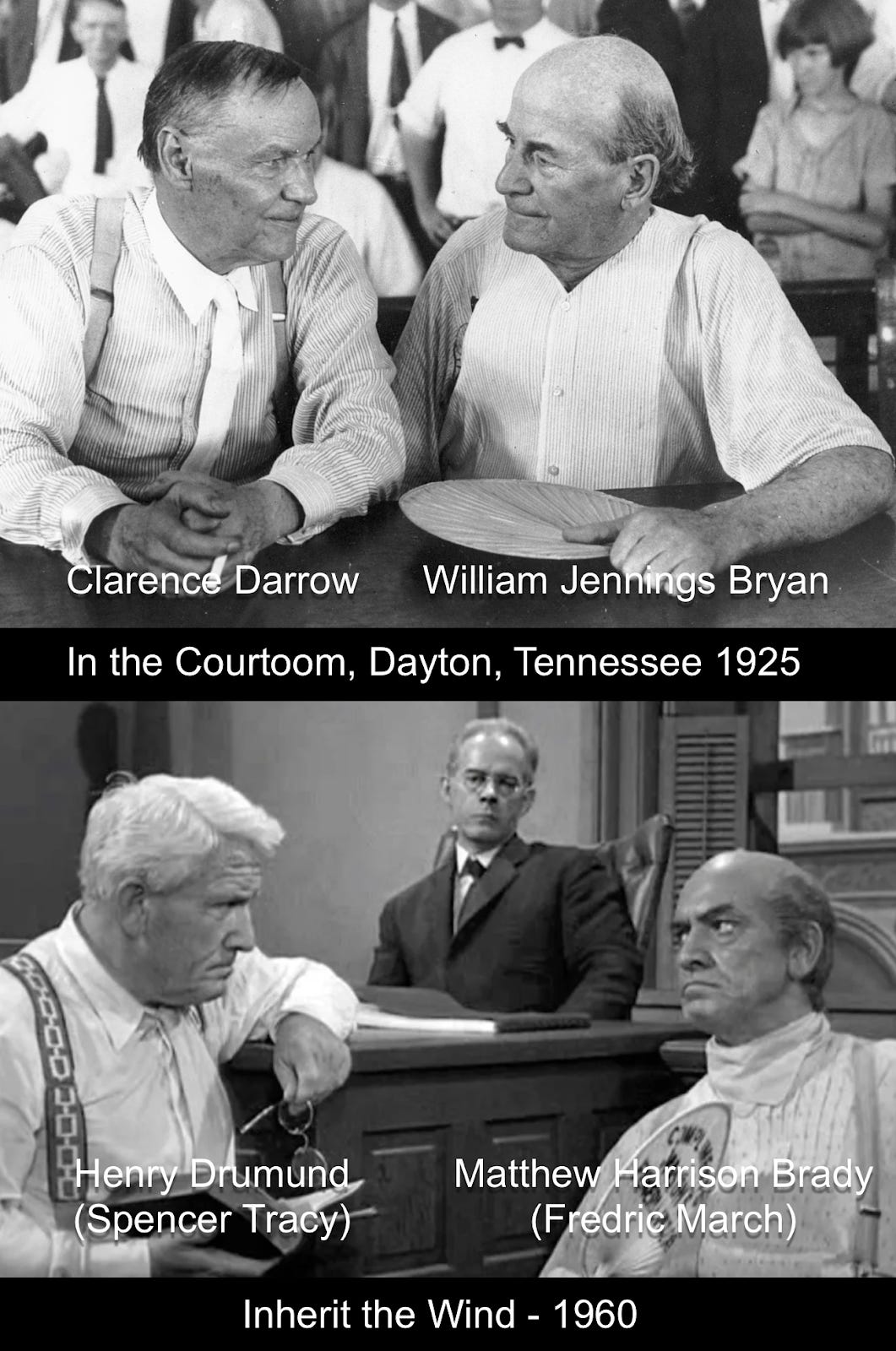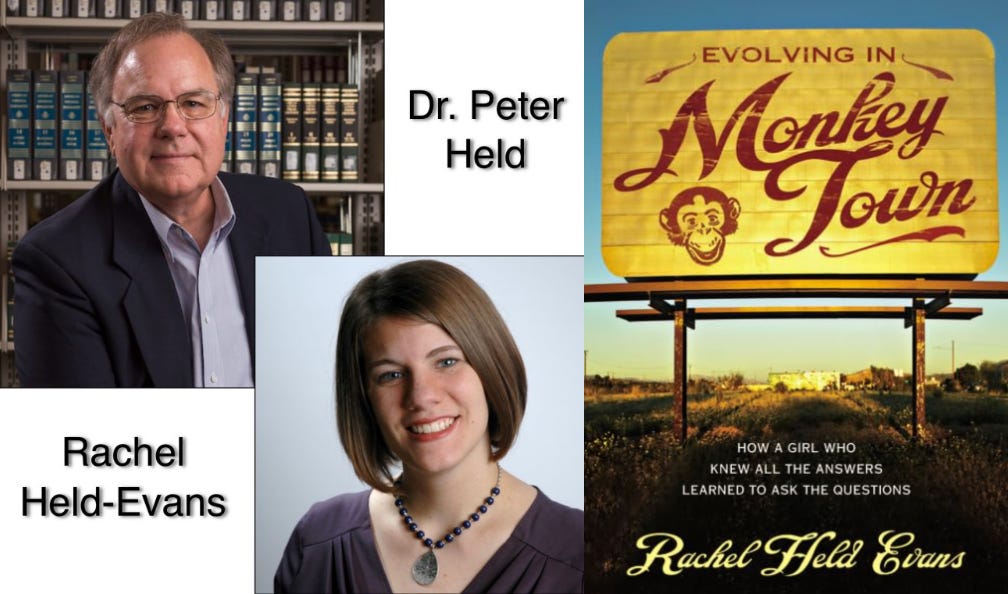More than a dozen years ago, I stumbled across a young writer gaining popularity. The title of her book got my attention: Evolving in Monkey Town: How a Girl Who Knew All the Answers Learned to Ask the Questions. She was a graduate of a small Christian college in Tennessee. Her father, a graduate of Dallas Theological Seminary, had been a long-time faculty member. To this day, her school is named after a man who ran for President three times and served as Secretary of State under Woodrow Wilson. Known for his dynamic public oratory, he earned the title: “The Great Commoner.”
The college is located in a small, out-of-the-way Tennessee community, made famous all across America because of a trial held right there in the county courthouse on the town square - one hundred years ago this year.
Author Rachel Held Evans became a pioneer in what would later be called “deconstruction.” I ran across her book when I was in the middle of mine.
From the earliest days, Rachel was a reader. She devoured books. In college, she majored in English literature. Reading stimulates curiosity. It prompts questions. It fosters a healthy skepticism. It broadens those horizons. It stimulates the need to know more. It scrutinizes sources. It identifies assumptions. It is dissatisfied with oversimplification. It revels in nuance. It sees what others miss.
So, in her Christian college, steeped in a uniquely fundamentalist brand of evangelicalism, she found some of her experience there to be unsettling. Some would call it cognitive dissonance. Her cherished faith had become completely identified with a political party. Women were expected to accept a subordinate role to men. Social justice was considered unbiblical. Evolution was dismissed as a dangerous “theory.” Instead, the school taught biblical Creationism. Her student body was nearly all white. LGBTQ students were barred from campus. Much of the Bible was taken literally - most moral and ethical and social questions were first measured by the Bible - “biblical authority” trumped everything else.
Add to all that, her hometown lived under the shadow of the infamous Scopes Trial of 1925.
Rachel had questions. All too often, the answers she got only triggered more serious queries. She found herself saying “Yes, but…” over and over. Rachel had a charming, sweet way about her - but she managed to earn a reputation on campus as an intellectual rabble rouser.
It was inevitable. Rachel finally took a deep dive into the history of what H.L. Mencken called “The Trial of the Century - The Scopes Monkey Trial” of 1925.
She called her memoir, “Evolving in Monkey Town.”
----------------
Page after page, I absorbed her words. In so many ways, her journey mirrored mine. When I read her, I was considerably older than Rachel (she could have been my daughter), but my journey through a Bible school known as fundamentalism's home turf, a seminary with a reputation for its scholarly evangelicalism, and many years serving evangelical churches - her questions were mine.
At the time, I had heard something about the trial, but I knew little about it. Now I know. In that same year, 1925, the State of Tennessee passed the Butler Act into law, making it illegal to teach evolution in any public school or state university. The ACLU (American Civil Liberties Union) saw it coming - and considered it a blatant violation of the First Amendment. Church and state are to remain separate. This was a clear effort to give priority to Biblical Creationism, establishing one brand of religion as authoritative in the public sphere.
The ACLU quickly found a Tennessee high school teacher willing to confess that he’d taught evolution in his classes. His name was John C. Scopes.
The trial became a very public debate over the presumed conflict between science and religion; evolution and creationism.
After finishing the book back then, I went online and streamed the 1960 feature film, Inherit the Wind, starring Academy Award nominee (for the role), Spencer Tracy. Alone, I curled up in my room and watched the entire film on my laptop in wide-eyed wonder, full volume through my headset, absorbing every scene.
But I didn’t want anyone to know. I was coming to terms with questions I learned long ago, one simply does not ask. I would keep it all to myself.
The film is a fictionalized version of the Trial. In the mid-fifties, just as the Joseph McCarthy House Un-American Activities Committee became dismissed and discredited, Inherit The Wind appeared on Broadway as a stinging metaphor of those god-awful McCarthy hearings. The play was a wild success, running to sold-out audiences for over two years, making it, at the time, one of the longest non‑musical plays on Broadway.
Then, in 1960, they made it a movie.
The heart of the film is the standoff between Scope’s defense attorney and the State’s prosecution attorney - Clarence Darrow vs. William Jennings Bryan (as in Bryan College - Rachel’s Alma Mater). The play and the film gave the characters fictional names: Darrow would be Harry Drumund (played by Spencer Tracy) and Bryan would be Matthew Harrison Brady (played by Fredric March).
Drumund (Darrow) - the New York skeptic, agnostic, free thinker, proponent of evolution, champion of the open mind, defender of the falsely accused, advocate of academic freedom, friend of science - in a clever legal maneuver, put Brady (Bryan) - the Great Commoner, self-proclaimed Bible scholar, anti-Darwin, anti-evolution, pro-religionist, apologist for the Christian God - on the witness stand.
The defense attorney (Drumund) called on the prosecuting attorney (Brady) to defend his Bible as the alternative to the legally prohibited “theory of evolution.” In an unprecedented move, Brady accepted the challenge and took the witness stand. Drumund went after him.
The heated exchange between these two aging, passionate characters - much of the dialogue drawn directly from the original court documents - was riveting. In my heart, I found myself rooting for Drumund. I was embarrassed by Brady. But I didn’t want anyone to know.
That was more than a dozen years ago.
I’m over my need to keep all this secret.
To this day, I am deeply grateful for (the late*) Rachel Held Evans, who evolved in Monkey Town and shared her story.
I have evolved, too.
-----------------
So this year, there’s been a whole lot of discussion around that hundred-year-old trial. There are several books, lots of articles, and at least three versions of the 1950s stage play, Inherit The Wind -
1960 Version the Classic starring Spencer Tracy as Drumund
1988 Made for Television - Starring Jason Robards as Drumund and Kirk Douglas as Brady
1999 Version - Starring George C. Scott as Drumund and Jack Lemon as Brady
I’ve watched all three.
Just this week, I finished reading the Pulitzer Prize-winning 1997 book by Edward J. Larson, Summer for the Gods: The Scopes Trial and America's Continuing Debate Over Science and Religion. In 2020, the book was re-released and includes some updates and an Afterword that brings the trial up to the current era.
All of this research has prompted me to want to write more. I’m going to make this Substack into a series - there’s so much to say. I’ll add more resources along the way.
Coming up on Substack - Scopes in 2025
The run-up to the 1925 Scopes Trial - Fundamentalism vs Modernism
The Summer of 1925 in Dayton - The First Ever Trial Reported Daily on the Radio
How does Inherit the Wind compare to the actual Dayton, Tennessee Trial?
The Aftermath - The Legacy of Scopes up until the present day
------------------
It’s not just the impact of the trial in the early part of the century. The issues that divided the nation then are still with us. As so often is the case, we can understand our current moment so much better if we can grasp what has happened in our past. The issues hotly debated in the Scopes trial remain in our collective DNA - in both religion and science.
And they remain in my own heart and mind.
I’m going to take a guess here.
They remain in yours, too.
---------END---------
*At only age 37, after establishing herself as a best-selling author, Rachel Held Evans succumbed to a rare infection, tragically passing away on May 4, 2019. She left behind her husband, Dan, and two young children. I grieved over this untimely loss, along with legions of others who found her work to be liberating and life-giving. She became a champion for the LGBTQ community along with many women struggling with an identity imposed by an oppressive fundamentalism. I was deeply honored and blessed to interview her father, Dr. Peter Held, on the November 13, 2020 edition of my podcast.



